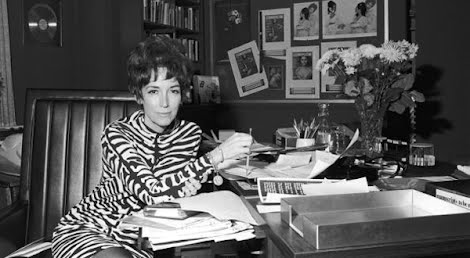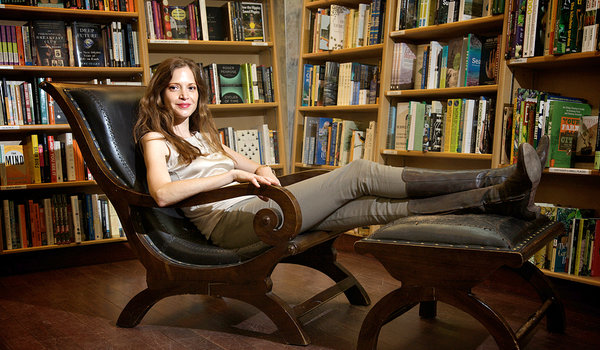Starting -- and hanging in

"How old are you? Twenty-one? Thirty? It doesn't matter -- you need only to have some kind of job somewhere. Then, from that most unillustrious beginning, however young or old you are, you move ever so gradually up, and, if you stay with it, the gradual moving up takes you to the top.
It's true. It doesn't matter where you start, or with what company; what matters is starting -- and hanging in.
May I tell you about my early jobs? They were pitiful, and I was pitiful in them."
I wish I could just excerpt the entirety of the late Helen Gurley Brown's book "Having It All" on my blog -- it's a favorite I have referenced a couple of times in the past -- but I would just entreaty you all to buy it (it's out of print, but I blessedly stumbled upon it at a vintage store a few years back and it seems to be in stock on Amazon still.) She is wonderful, funny, ridiculous, brilliant, and so helpful and woman-centric and instructive and loving -- not to mention how she's instilled into me an respect for the power of italics.
I have to assume that anyone who is deriding Helen Gurley Brown's legacy when it comes to women and feminism (as have some people whose thoughts I otherwise often respect) has not read enough of her work to really understand what she was about. Today's Cosmopolitan has nothing to do with what HGB pioneered.
Anyway. That mouseburger will be sorely missed, and may she rest in peace.
Hopeful shopping

Last week the New York Times' Thursday Styles section profiled bookstore owner Sarah McNally, who owns "the determinedly WiFi-free McNally Jackson Books on Prince Street in Nolita." It was a really enjoyable read, and here are a few reasons why:
The machine can cost more than $100,000, a huge investment for an independent bookstore, but it makes sense when the NYT describes it as "Ms. McNally's grand gambit against the e-book pestilence." I also loved this description:
Ms. McNally gazed tenderly at the behemoth as it printed 'Veiled Women,' by Marmaduke Pickinthall (1913) for a customer. "Look," she cooed, as mechanical thingamabobs measured and bound the new book. "It's still warm, like cookies fresh out of the oven."
And the profile is full of little tidbits as evidence. To wit:
She sipped tea, coughing, her thin body shaking. Bad cold? "Technically, I had tuberculosis," she said with a shrug.
I always think of aspirational shopping as purchasing a fancy pair of shoes that don't fit into your lifestyle, a pair of jeans that are too snug, or a luxury car you can't quite afford. But buying books can be similar in that it represents the kind of person you hope to be, knowledge you hope to have in the future. I never thought of it that way until I read this:
"I believe that within every great reader there are multitudes of people," she said... Book buying is aspirational, she added. "They are deeply hopeful purchases."
Come on, come out

"Spend the day outside communing with nature. Seriously. It's like pushing a reset button on your mind and wiping out the crazy."
-Rory Freedman and Kim Barnouin in the Skinny Bitch series (which I picked up at the library but don't exactly recommend, although it has its moments.)
I'm a firm believer in the crazy-erasing effect of spending any decent amount of time outside, whether it's a day-long hike in the rainforest or a 20 minute walk down a tree-lined street (which is how I came to take this photo.)
Mars and Venus in interviews
"Well, first off, don't interview a guy if a woman is available. Guys don't notice anything. I probably asked twenty of DiMaggio's teammates about the party after the 1947 World Series at the Waldorf-Astoria. And they'd say, 'Aw it was great! There was a band and everything was first-class. Joe was real happy that night!'
Then I'd ask one of their wives to describe the party. And she'd say, 'Yes, it was a wonderful party. But the flowers were dreadful. And the food was late. And Phil Risutto's mother came in wearing the oddest hat...'
They know everything. Guys are hopeless."
--from the chapter on Richard Ben Cramer in The New New Journalism, in which top-notch nonfiction writers are interviewed about their work habits. I bought it last week for $6 on the discount shelf at Dog Eared Books, and it's been a pretty good read! It's kind of like Coders at Work for journalists.
I've definitely found there are differences in what men and women tend to remember, but I wouldn't say that one gender is better to interview than the other-- the information you get is just different. I've been exasperated at my husband many a time when trying to get details on something emotional or interpersonal ("They broke up? What happened? Well, what did he say? You didn't ask?") but he's amazing at remembering, say, how many miles per gallon his car could get in high school.
It's not surprising that women would have the dirt on what a party was really like-- but I bet every one of those men interviewed could remember the final scores of all seven games of that year's World Series, and lots of them could still give a pretty mean play-by-play.
Then I'd ask one of their wives to describe the party. And she'd say, 'Yes, it was a wonderful party. But the flowers were dreadful. And the food was late. And Phil Risutto's mother came in wearing the oddest hat...'
They know everything. Guys are hopeless."
--from the chapter on Richard Ben Cramer in The New New Journalism, in which top-notch nonfiction writers are interviewed about their work habits. I bought it last week for $6 on the discount shelf at Dog Eared Books, and it's been a pretty good read! It's kind of like Coders at Work for journalists.
I've definitely found there are differences in what men and women tend to remember, but I wouldn't say that one gender is better to interview than the other-- the information you get is just different. I've been exasperated at my husband many a time when trying to get details on something emotional or interpersonal ("They broke up? What happened? Well, what did he say? You didn't ask?") but he's amazing at remembering, say, how many miles per gallon his car could get in high school.
It's not surprising that women would have the dirt on what a party was really like-- but I bet every one of those men interviewed could remember the final scores of all seven games of that year's World Series, and lots of them could still give a pretty mean play-by-play.